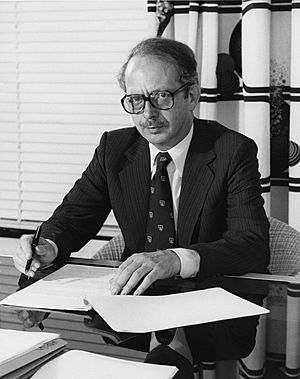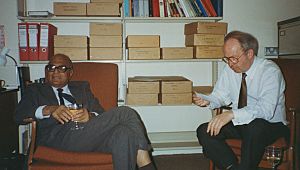Ralf Dahrendorf facts for kids
Quick facts for kids
The Lord Dahrendorf
|
|
|---|---|

Dahrendorf in 1980
|
|
| Member of the House of Lords Lord Temporal |
|
| In office 15 July 1993 – 17 June 2009 Life Peerage |
|
| European Commissioner for Research, Science and Education | |
| In office 6 January 1973 – 5 January 1977 |
|
| President | François-Xavier Ortoli |
| Preceded by | Fritz Hellwig |
| Succeeded by | Guido Brunner |
| European Commissioner for Trade | |
| In office 1 July 1970 – 5 January 1973 |
|
| President | Sicco Mansholt Franco Maria Malfatti |
| Preceded by | Jean-François Deniau |
| Succeeded by | Christopher Soames |
| Parliamentary Secretary of State for Foreign Affairs | |
| In office 22 October 1969 – 2 July 1970 |
|
| Chancellor | Willy Brandt |
| Preceded by | new appointment |
| Succeeded by | Karl Moersch |
| Member of the Bundestag | |
| In office 28 September 1969 – 2 July 1970 |
|
| Constituency | FDP List |
| Personal details | |
| Born | 1 May 1929 Hamburg, Weimar Republic |
| Died | 17 June 2009 (aged 80) Cologne, Germany |
| Nationality | British German |
| Political party | Liberal Democrats (UK) FDP (Germany) |
| Spouses | Vera Dahrendorf (née Vera Banister) Ellen Dahrendorf (née Ellen Joan Krug) (1980–2004) Christiane Dahrendorf (née Christiane Klebs) (2004–2009) |
| Children | Nicola, Alexandra, and Daphne Dahrendorf |
| Alma mater | University of Hamburg London School of Economics |
| Profession | Sociologist |
|
Ralf Dahrendorf
|
|
|---|---|
| Known for | Providing a new definition of class conflict based on authority relations |
| Scientific career | |
| Influences | Marx, Weber, Popper, Hayek, Kant |
Ralf Gustav Dahrendorf, Baron Dahrendorf (1 May 1929 – 17 June 2009) was an important German-British thinker. He was a sociologist (someone who studies society), a philosopher, and a politician. He was known for his ideas about how different groups in society can have conflicts.
Dahrendorf wrote many books and articles. Two of his most famous works are Class Conflict in Industrial Society (1959) and Essays in the Theory of Society (1968).
During his career, he held several important political roles. He was a member of the German Parliament. He also worked for the German Foreign Office. Later, he became a European Commissioner, helping to lead the European Union. In the UK, he became a member of the House of Lords. He was known as Lord Dahrendorf.
He also led two famous universities: the London School of Economics and St Antony's College, Oxford. He taught sociology at many universities in both Germany and the UK.
Contents
Ralf Dahrendorf's Life Story
Early Life and Family
Ralf Dahrendorf was born in Hamburg, Germany, in 1929. His father, Gustav Dahrendorf, was a politician.
Ralf and his family were strongly against the Nazi regime. As a teenager, Ralf was part of the Deutsches Jungvolk, a youth group. But he and his father were arrested because they opposed the Nazis. Ralf even handed out leaflets telling people not to join the Nazis.
After this, his family moved to Berlin. In 1944, during the last year of World War II, he was arrested again for his anti-Nazi actions. He was sent to a concentration camp in Poland but was freed in 1945.
Marriages and Children
Ralf Dahrendorf was married three times. His first wife was Vera, whom he married in 1954. They met while studying at the London School of Economics. They had three daughters: Nicola, Alexandra, and Daphne. His daughter Nicola Dahrendorf has worked for the United Nations.
From 1980 to 2004, he was married to Ellen Dahrendorf. In 2004, he married Christiane Dahrendorf.
Education and Career Path
Ralf Dahrendorf studied philosophy and sociology at Hamburg University from 1947 to 1952. He then earned his PhD in sociology from the London School of Economics in 1954.
He became a professor of sociology at several German universities. He was also a visiting professor at Columbia University in New York.
From 1969 to 1970, he was a member of the Bundestag (the German parliament). He also served as a Secretary of State in the German Foreign Ministry. In 1970, he became a Commissioner in the European Commission in Brussels. He strongly believed in the European Union.
From 1974 to 1984, Dahrendorf was the director of the London School of Economics. Later, he became the Warden of St Antony's College, Oxford from 1987 to 1997.
In 1988, he became a British citizen. In 1993, he was given the title Baron Dahrendorf. This meant he became a life peer and could sit in the House of Lords. He chose the name "Clare Market" for his title, which is near the London School of Economics.
Dahrendorf held dual citizenship in the UK and Germany. He lived in both countries but often said, "I am a Londoner." He felt a connection to both his birth country, Germany, and Britain.
He believed in laws that promoted personal freedom and equal opportunities. He thought that Germany's problems came from seeking "absolute answers" and strong leaders.
Death
Ralf Dahrendorf passed away in Cologne, Germany, on 17 June 2009, at the age of 80. He had been suffering from cancer.
Germany's Chancellor Angela Merkel said that Europe had lost "one of its most important thinkers."
Dahrendorf's Main Ideas
Understanding Class and Conflict
In 1959, Dahrendorf published his most important book on social inequality, Class and Class Conflict in Industrial Society. He wanted to explain how different groups in society have conflicts.
He looked at two main theories: Marxism and structural functionalism.
- Marxism focused on how wealth caused conflict.
- Structural functionalism focused on how society works together.
Dahrendorf believed that neither theory alone could fully explain society. He thought that Karl Marx's idea of class was too narrow. Marx said that class was mainly about who owned property. In Marx's time, rich people had all the power.
Dahrendorf argued that society had changed a lot since Marx's time. He believed that class was not just about wealth, but about who has authority (power to give orders). He said that conflict happens when groups with authority clash with groups who don't have it.
His Theory of Class Conflict
Dahrendorf developed his own theory of class conflict. He said that conflict is a natural part of society. He believed that modern society, which he called "post-capitalist," has found ways to manage these conflicts. For example, unions and courts help resolve disagreements peacefully.
He also said that society needs both agreement (consensus) and conflict. He believed that conflict can actually lead to positive changes and new agreements.
The Idea of Authority
A key part of Dahrendorf's theory is the idea of authority. He said that authority is linked to positions in society, not just to individuals. For example, a teacher has authority in a classroom, but a student does not.
He explained that groups with common interests come together. He called these "interest groups." These groups might have "latent interests" (unconscious shared goals) that become "manifest interests" (conscious goals) when they organize.
Dahrendorf believed that understanding authority was the key to understanding social conflict. He saw society as divided into a "command class" (those with authority) and an "obey class" (those without authority). Conflicts happen between these two groups.
How Dahrendorf Compared to Other Thinkers
Dahrendorf's ideas were different from many other thinkers of his time. He agreed with Karl Marx that conflict is a basic part of society. But he thought that class conflict could lead to good changes.
He also disagreed with Marx's idea that the working class would become one big group. Dahrendorf pointed out that in modern society, there are many differences in income, skills, and opportunities.
Like Max Weber, another famous sociologist, Dahrendorf believed that different levels of authority are natural in modern societies.
The Ralf Dahrendorf Prize
Since 2019, the German Federal Ministry of Education and Research has given out the Ralf Dahrendorf Prize. This award honors excellent research projects. It also helps scientists share their findings with the public.
The prize gives 50,000 euros to winning research projects. This money helps researchers continue their work and find new ways to communicate their ideas. A jury of scientists and media experts chooses the winners.
Publications in English
- Dahrendorf, Ralf. (1959) Class and Class Conflict in Industrial Society.
- Dahrendorf, Ralf. (1968) Essays in the Theory of Society.
- Dahrendorf, Ralf. (1967) Society and Democracy in Germany.
- Dahrendorf, Ralf (1974) The New Liberty (BBC Radio talks)
- Dahrendorf, Ralf. (1979) Life chances: Approaches to Social and Political Theory.
Awards and Honours
- 1975: Elected member of the American Academy of Arts and Sciences
- 1977: Honorary Degree from the University of Bath
- 1982: Knight Commander of the Order of the British Empire (KBE)
- 1989: Grand Cross with Star and Sash of the Order of Merit of the Federal Republic of Germany
- 1993: Life Peer (Baron Dahrendorf)
- 1997: Theodor-Heuss-Preis
- 2003: Pour le Mérite
See also
 In Spanish: Ralf Dahrendorf para niños
In Spanish: Ralf Dahrendorf para niños
- Dahrendorf hypothesis
- List of liberal theorists
 | John T. Biggers |
 | Thomas Blackshear |
 | Mark Bradford |
 | Beverly Buchanan |


